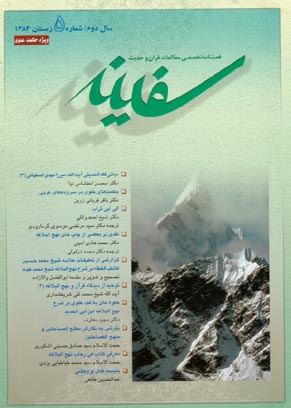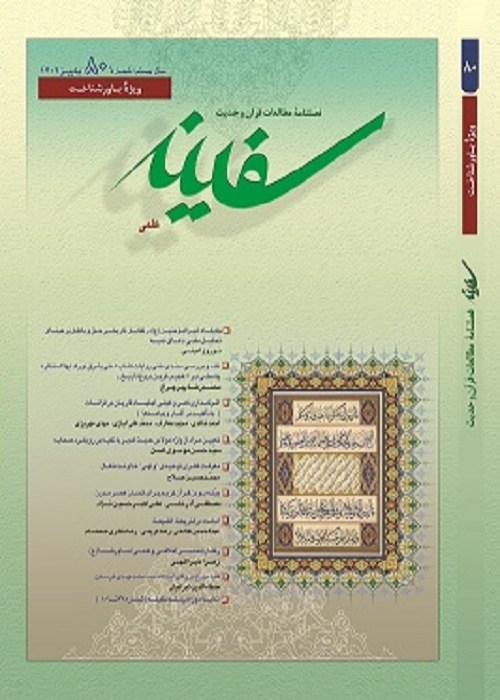فهرست مطالب

نشریه سفینه
پیاپی 5 (زمستان 1383)
- ویژه حکمت علوی
- 202 صفحه، بهای روی جلد: 15,000ريال
- تاریخ انتشار: 1384/02/30
- تعداد عناوین: 14
-
-
صفحه 3
- مقالات
-
صفحه 8نویسنده، در سه گفتار پیشین - که از شماله 2 تا شمراه 4 درج شد - بخشی از مبانی فقه الحدیثی آیه الله میرزامهدی اصفهانی را بر اساس آثار ایشان مورد بحث و بررسی قرار داده است. در این گفتار، مروری بر آن مطالب همراه با تبیین برخی مطالب، در قالب 20 نکته ارائه می شود.کلیدواژگان: اجتهاد، فقاهت، اصفهانی، میرزامهدی، اصولیان، اخباریان، استنباط احکام، اصول فقه
-
صفحه 25کلمات جاودانه حکمت علوی، بر ادبیات عرب، اثری شایان نهاده اند. نویسنده در این گفتار، 86 مورد از سخنان حضرت امیرالمومنین علی بن ابی طالب (ع) را آورده، که مستقیما بر شعر شاعران عرب اثر نهاده اند. در این مقاله، به 6 عنوان کتاب حدیثی شیعی، 5 شرح نهج البلاغه، و حدود 30 منبع مهم ادبیات عرب، استناد شده است.کلیدواژگان: نهج البلاغه، ادبیات عرب، اشعار عربی
-
صفحه 63ناظم در این قصیده، نکاتی بارز از سیره امیرالمومنین (ع) را با احساس و تخیل در هم آمیخته است.کلیدواژگان: وائلی، احمد، مدایح علوی، ادبیات عرب
- بخش ویژه
-
صفحه 74کتاب «نهج البلاغه» از زمان تالیف تا کنون، بیش از هزار سال است که در کانون توجه و مراجعه قرار دارد. در این میان، پس از رواج صنعت چاپ در شرق، چاپ حروفی شیخ محمد عبده در بیروت و مصر و نیز چاپ حروفی صبحی صالح در بیروت، بسیار مورد توجه بوده و هست. نویسنده در این گفتار - که پس از رجوع به نسخه های خطی و شروح کهن نهج البلاغه نگاشته - مواردی از تصحیف و تحریف را در چاپ عبده و صالح تذکر می دهد.کلیدواژگان: نهج البلاغه، بررسی انتقادی چاپ ها، نهج البلاغه، چاپ محمد عبده، نهج البلاغه، چاپ صبحی صالح
-
صفحه 94شیخ «محمدحسین آل کاشف الغطاء» (1294 - 1373 هجری قمری) یکی از مراجع دینی شیعه در روزگار معاصر بود که در دو عرصه علم و اجتماع به ایفای نقش فعال پرداخت. او در زمینه فعالیت های علمی آثار متعددی را تالیف کرده که برخی از آنها هنوز به چاپ نرسیده است. یکی از این آثار، تعلیقات وی بر شرح نهج البلاغه شیخ «محمد عبده» (متوفی 1323 هجری قمری)، مفتی الازهر و شاگرد و همکار سید جمال الدین اسدآبادی است. مقاله حاضر بر آن است تا این تعلیقات را گزارش کند.کلیدواژگان: کاشف الغطاء، محمدحسین، شیخ محمد عبده، شروح نهج البلاغه
-
صفحه 124نگارنده در این گفتار، با تاکید بر سه اصل توحید (عدم مشابهت خدا با خلق، مبرا بودن خداوند از نقائص، توقیفیت اسماء و صفات الهی)، این اصول را در برخی از آیات و پاره ای از جملات خطبه اول نهج البلاغه پی می گیرد. در خلال مباحث، بعضی از دیدگاه های فلاسفه و عرفا نیز نقد و بررسی می شود.کلیدواژگان: نهج البلاغه، توحید، قرآن و توحید، تنزیه الهی، توقیفیت اسماء و صفات الهی، تنزیه خداوند، خطبه اول نهج البلاغه، دیدگاه های فلاسفه و عرفا درباره توحید
-
صفحه 137شرح ابن ابی الحدید معتزلی از جمله شروح نهج البلاغه است که به جنبه ادبی و بلاغی نهج البلاغه توجه ویژه کرده است. مولف آن می کوشد تا با اتکاء به منطق ادبی، علاوه بر اثبات اصالت نهج البلاغه، جلوه های گوناگون بلاغت را در سخنان امیرالمومنین (ع) نشان دهد و از این طریق، تفوق کلام امام (ع) را بر سخنان دیگر خطبا و بلغاء مبرهن سازد.کلیدواژگان: ابن ابی الحدید، نهج البلاغه، بلاغت، فصاحت، انحاء سبک، بیان و بدیع، استعاره، تشبیه، التفات، استخدام، کنایه، تقسیم عددی
- اسناد و متون
-
صفحه 157آنچه در این مقال از دید خواننده گرامی می گذرد، مروری است گذرا بر کتاب ارزشمند «مطلع الصباحتین و مجمع الفصاحتین»، و زندگانی مولف آن، شیخ اسعد شفروه اصفهانی، از دانشمندان و ادیبان سده هفتم هجری، با نگاهی به مطالب مندرجه کتاب، سبک تالیف، نسخه های کتاب و اهمیت آن، و دیگر مطالبی که به گمان نگارنده، ذکر آنها در معرفی یک اثر و صاحب آن، مناسب یا ضروری بنظر می رسد.کلیدواژگان: نهج البلاغه، شروح، اسعد شفروه اصفهانی، ابوالسعادات، علمای امامیه، قرن هفتم، مطلع الصباحتین و مجمع الفصاحتین
- گزارش و معرفی
-
صفحه 176
-
صفحه 189
- بازتاب
-
صفحه 193
-
صفحه 195
-
صفحه 1
-
Page 8In the last tree parts of this essay, the writer tried to discuss and analyze the Jurisprudential bases of the late Scholar, Ayatullah Mirza Mahdi Esfahani, according to the contents of his works. In the last part of the essay, a short review over the previously stated subjects with some examples are given within 20 topics.
-
Page 25The Imam Ali's everlasting words, thoughts, and teachings have clear traces and inflences at the Arabic literature. In this essay, the author has brought 86 sentences from Amir ul-Momenin Ali ibn Abi Taleb (A.S.), which have been directly appeared in the Arabic poems. In this essay references are made to 6 Shia collections of traditions, 5 commentaries of Nahj ul-Balagha, and 40 titles of the important Arabic literal works.
-
Page 74The book of Nahj ul - Balagha from the time of the compilation in about 1000 years ago, have been in the center of attention a reference of many people. After development of the industry of printing during the last century, the prints of this book by the supervision of Shaikh Mohammad Abdu in cairo, and the Nahj ul - Balagha with the comments of Shaikh. Sobhi Saleh, Printed in Beirut received the attention of many interested people. In this essay, the writer, reviews some of the ancient manuscripts of Nahj ul Balagha, and by comparing them with the print of Abdu and Sobhi Saleh, some of the mistake and change of the latter print are shown.
-
Page 94The late Shaikh M.H. Kashef ul-Qeta (1878-1955) was one of the Shia religious scholars and leaders during the last century, who was active in both fields of Jurisprudence and social affairs. He had written many scientific books, that some of them are not printed yet.One of those works, is his "comments" about the "Sharh e Nahj ul-Balagha" of Shaikh M. Abdu (Died in 1905), the high rank Sunni Scholar, the principal of the Al-Azhar academy of Egypt, the close friend and student of Syed Jamal oddin Asad-Abadi. The current essay gives a report about that work.In the first part (this volume) the notes of Kashef ul-Qeta about the speeches of Nahj ul-Balagheh, and in the 2nd part (next volume) his notes and comments about the letters and sentences of Nahj ul-Balagha will be provided.
-
Page 124In this essay, the writer, by application of some of the Quranic verses and statements of Nahj ul-Balagha has tried to highlight the three differential and distinctive specialities of Monotheism (lack of any similarity between the God and mankind, lack of any defect in the Almighty God, The Excptional and Exclusive nature of the Divine Names and Attributes. )During the discussion some of the philosophical and gnostic viewpoints have been studied and criticized too.
-
Page 137The commentary book of Ibn Ali Al-Hadid has paid a special attention to the literal aspects of Nahj ul-Balagha. The author has tried to show the frequent eluquent characteristics in the words, texts, and speeches of Amir ul-Momenin (A.S.), and hence he reveals the superiority of the words and literature of the Imam, over those of the other speakers and poets.
-
Page 157What is presented in this essay to the respected readers, is a review over the above valuable book and a short biography of its author, who was one of the Scholars and literal man of 7th century (A.H.) A short history about the book and its contents, the available copies of the book, the importance of the book, and other informations which could be useful or neccessary in introduction of the book.


